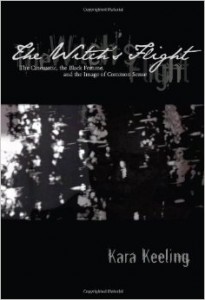 The Witch’s Flight: The Cinematic, the Black Femme, and the Image of Common Sense
The Witch’s Flight: The Cinematic, the Black Femme, and the Image of Common Sense
by Kara Keeling
Duke University Press. 209 pages, $22.95
AT FIRST GLANCE, this scholarly analysis of the impact of cinema and television on “common sense” (commonly accepted but not necessarily sensible) images of “blacks” and “women” within a racist, sexist, homophobic, postcolonial, capitalist culture looks like a summary of earlier theories. Keeling draws especially on Gilles Deleuze’s conception of “the cinematic” as a means of creating—not simply reflecting—social reality. Along the way, she refers to the theories of Franz Fanon, Angela Davis, Karl Marx, and Antonio Gramsci. Finding Keeling’s own thesis among all the references to her intellectual forebears requires some effort.
The effort is worthwhile. Keeling’s analysis of the widely televised image of Black Panthers in 1967 entering the halls of government in Sacramento brandishing guns to protest a proposed new law, is worth the price of the book in itself. Keeling explains why a surprisingly large number of women joined the Black Panther Party in the wake of those shocking images of hypermasculine behavior, a departure from a tradition of stereotyped American images of “blacks” based in slavery and revolt. She explains why the guerilla fighter image created by leather jackets, berets, and guns not only referred to liberation fighters in other parts of the world but counteracted an older “feminine” image of black men and women as passive and irrational, identified largely with the physical, existing to be acted upon.
Revising retrospective feminist analyses of 1960’s notions of “Black Power,” Keeling explains that in its early days this concept advanced the gender-neutral goal of claiming the role of “citizen” from which all African-American people had historically been excluded. She also explains how quickly the image of “the black man” as non-gender specific became specifically male and sexist both within the Black Panther Party and more widely in African-American culture. She also shows how a rigid and exclusive conception of “man” inevitably led to the policing of gender norms and hostility to “bulldaggers” (women thought to be too masculine and in sexual competition with males) as well as “fags” (men perceived as embodiments of feminine powerlessness).
Keeling shows how the direct emergence of “blaxploitation” films from the new image of “blacks with guns” helped rescue the Hollywood film industry from a financial crisis by securing just the viewer demographic it was trying to reach. It was Melvin van Peebles’ Sweet Sweetback’s Baadassss Song in 1970, notes Keeling, that’s “credited with having established that there is a large, black teenage audience for films that feature a ‘macho black hero’ … thereby ushering in a roughly five-year period of cheaply made feature films with predominately [sic]black casts.”
Keeling, an assistant professor of critical studies and African-American studies at USC, goes on to trace the long-term cultural aftermath of events in the 1960’s in terms of popular visual images and corresponding “sheets of history” (perceptions and conceptions of the history of Americans of African descent) through popular films. Her argument is sweeping but persuasive: that the politics and culture of African-Americans since the beginning of the 20th century are inseparable from the development of the movie industry and then television.
The Witch’s Flight is part of a scholarly series, “Perverse Modernities,” edited by Judith Halberstam and Lisa Lowe. The book is not always easy to grasp, but for those interested in cultural analysis it rewards serious attention. Individual chapters can be read on their own. Readers who are specifically interested in Keeling’s body of work can also seek out Racist Traces and Other Writings: European Pedigrees/African Contagions, which she co-edited with James A. Snead. In her new book, Keeling successfully digs below surface realities in a way that is scrupulous and methodical.
____________________________________________________________________
Jean Roberta is a freelance writer based in Regina, Saskatchewan.





